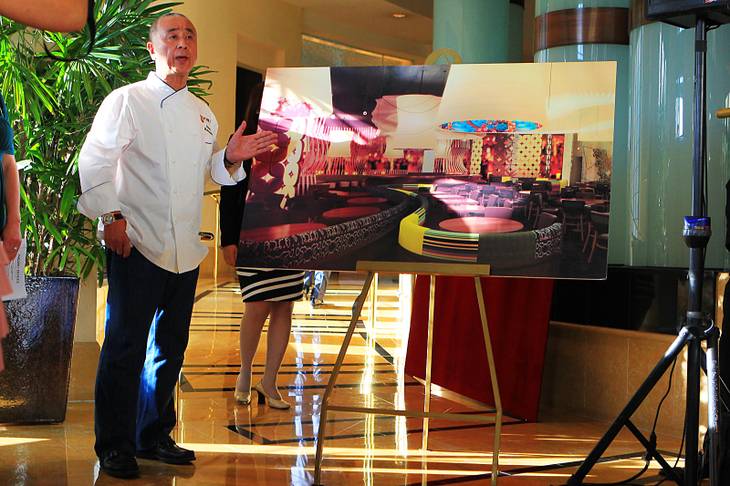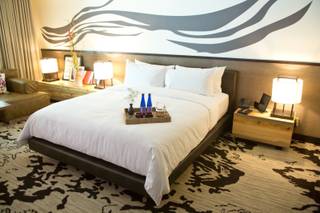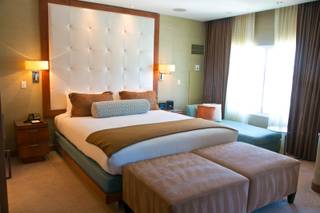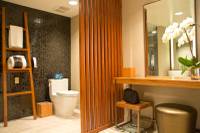Las Vegas has more hotel rooms than any other U.S. city, but unlike many other tourist destinations, it generally isn’t known for trendy boutique hotels.
That isn’t to say the city doesn’t have niche properties. It does. A good number of them, in fact.
Ironically, Caesars Palace, the megaresort with 3,950 rooms, could play a key role in raising Las Vegas’ profile as a boutique hotel city. Caesars Entertainment is in the process of opening at Caesars Palace the world’s first Nobu Hotel — a luxury boutique “hotel within a hotel” branded around celebrated Chef Nobu Matsuhisa. It is anticipated to open by the end of the year.
“There is a need now to find a reason to come to Las Vegas, and we’re trying to create that need by having a different experience,” said Gigi Vega, general manager of the Nobu Hotel and a Caesars luxury hotel operations executive.
Getting the word out about specialty hotels can only help resort owners as occupancy rates remain low by Las Vegas standards.
Given its location just off the busy Caesars casino floor and near the Colosseum where Shania Twain begins her residency Dec. 1, the $30 million, 181-room Nobu will be among the more visible boutique hotels in Las Vegas.
Other local boutique and niche hotels, on and off the Strip, include Rumor on East Harmon Avenue, the Artisan on West Sahara Avenue, the El Cortez Cabana Suites downtown, Element in Summerlin, the Platinum on East Flamingo Road, Signature and SkyLofts at MGM Grand, Sky Suites at Aria, Hotel 32 in the Monte Carlo, The Hotel at Mandalay Bay and the SLS Las Vegas planned for the former Sahara site.
What exactly is a boutique hotel?
“They (typically) have fewer rooms, thus a more intimate feel than large resorts or hotels, and individual design-forward décor that’s anything but stuffy,” said Arabella Bowen, executive editorial director at Fodor’s Travel in New York. “High-tech gadgetry is often standard fare (such as free Wi-Fi and iPod docks), which appeals to the digital set. Typically, guests can also count on a buzzy on-site restaurant and/or bar frequented by locals, which helps make visitors feel immediately connected to the local scene.”
San Francisco, Miami, Los Angeles, New York, Seattle and Portland, Ore. — and to a lesser degree, Austin and Chicago — are known for their niche hotels, Bowen said. Las Vegas typically does not come up in national conversations about the trend.
Despite its size, the Las Vegas property that best represents a boutique or niche hotel is the 2,966-room Cosmopolitan, Bowen said.
A spokesman for the Las Vegas Convention and Visitors Authority, which markets the city to the world, said the LVCVA doesn’t keep a list of local boutique properties. It’s difficult to compare offerings in Las Vegas with other markets because of the lack of a consensus definition of “boutique,” he said.
Indeed, some local properties that might be considered to be niche offerings aren’t marketed that way. For instance, CityCenter calls the Mandarin Oriental “a sophisticated luxury hotel,” not a boutique hotel. The nearby Vdara is dubbed “an internationally inspired, non-gaming, smoke-free, all-suite, eco-friendly boutique hotel and spa.”
The Harmon was designed to be a boutique property but likely will never open because of construction defects.
Branding a hotel as boutique can pay off. MGM Resorts International found success, for example, with its niche project at the Monte Carlo.
Hotel 32 opened on the Monte Carlo’s top floor in August 2009, 18 months after water damage resulted from a rooftop fire.
“We were given a unique opportunity to go with something completely different than what we had before,” said Claes Landberg, the Monte Carlo’s vice president of hotel operations. “Las Vegas is known to have large megacomplexes. There were not a lot of ultra-luxurious boutique experiences in Las Vegas.”
Nearly three years after the debut of the 50-suite hotel within a hotel, owners are pleased with its performance. Hotel 32’s rates start at $350, more than double the average at the Monte Carlo.
For the price, customers receive limousine rides from the airport and VIP treatment from staff. Luxury amenities enable the property to attract higher-spending travelers who otherwise would have gone elsewhere.
“We’ve seen a trend where travelers are willing to spend a little extra for that personal touch and experience where they have almost a respite from their very active lifestyle in Las Vegas while they’re here,” Landberg said. “Most of Las Vegas is about transactional experiences versus creating relationships, which is what we’re all about here. You can’t curate special moments for people if you don’t know them and give them the time to explore everything that’s available.”
Las Vegas may not be recognized much nationally for its niche and boutique properties because they’ve been overshadowed by the city’s megaresorts.
“For the longest time, Las Vegas was known for the big-box atmosphere on the Strip,” said Michael Crandall, senior vice president at local boutique hotel owner the Siegel Group.
Another factor may be that some of the larger niche offerings don’t fit into the usual boutique definition of being small, with easy access in and out for guests and with general managers readily accessible to visitors.
Seyhmus Baloglu, a professor and assistant dean at UNLV's hotel college, said marketing is key to getting the word out about boutique and niche properties in Las Vegas.
''The (marketing) focus has always been on the number of heads rather than average spending per person on their visit. Mass tourism is very important for Las Vegas given the room and meeting space capacity. However, there is a market out there who would be interested in gaming or nongaming niche and boutique concepts. They should be promoted, listed, and made available in multiple online and offline distribution channels, which could further diversify the tourism product Las Vegas offers,'' Baloglu said.
Nobu Hotel will be the latest entrant into the local boutique market and the first of multiple Nobu hotels planned around the world.
The hotel, which was created by refurbishing Caesars Palace’s 1967 Centurion Tower, is being billed as the first celebrity-chef branded hotel venture. Matsuhisa, noted designer David Rockwell, actor Robert De Niro and movie producer Meir Teper are behind the project, which will sit atop a Nobu restaurant and lounge. Both are expected to be used as a setting for an upcoming movie called “Last Vegas” starring De Niro and Michael Douglas.
Nobu will feature VIP check-in, preferred access to the Nobu restaurant and Zen-like rooms decorated with low-sitting furniture and wood touches. Walls will be adorned with calligraphy, and works by up-and-coming Japanese artists will be displayed. Room rates will start at $300, with plans to start booking reservations Oct. 1.
Bowen said Nobu seems to be unique in that celebrity chefs typically align themselves with existing hotel brands as opposed to creating their own new brand. For instance, Nobu already has a Las Vegas restaurant at the Hard Rock Hotel. It’s one of 25 Nobu restaurants around the world.
Vega said bringing a Japanese restaurant hotel brand into the Roman-themed Caesars Palace should boost Caesars’ standing in the luxury hotel segment and bring more higher-spending guests to the property.
“It addresses a different market segment that Caesars Palace can reach,” she said. “There is a trend of sub-branding within the same umbrella. It’s being able to fit within the market segment that is out there looking for the various experiences.”
UNLV experts said the hotel-within-a-hotel initiative at Caesars is a good concept.
“By bringing in a high-end brand, it gives cachet to the Caesars brand,” said Tony Henthorne, a professor and associate dean at the William F. Harrah College of Hotel Administration at UNLV.
“Caesars Entertainment recently moved to position itself as a more upscale brand, starting with changing its corporate brand name (from Harrah’s Entertainment),” Baloglu added. “Co-branding enhances the credibility of the hotel’s brand by borrowing credibility from other brands.”



